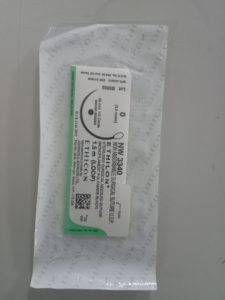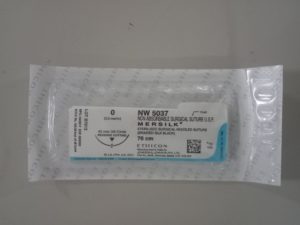An ideal suture material is flexible, strong, easily tied and securely knotted.it stimulates, skin closure material characteristics mentioned below. Some of the products for skin closure like Steristrips, Dermabond, suture silk, nylon suture, etc.
- Less tissue reaction
- Reduces the risk of infection.
Mainly for skin closure, the cosmetic property is preferable to the surgeons for better wound healing and less scar formation.
Skin closure Steristrips
Sterile adhesive tape Steristrip placed across the incision will also prevent surface marks.
Its used either primarily or after surface suture have been removed partially.
To reduce the needle and suture in situ, researchers and surgeon found these materials.
Taping will not correct errors in suturing that have resulted in uneven edges or tension across the incision. Tape burns may occur if there any excessive tension or swelli ng around the incision.
ng around the incision.
Nylon
The use of monofilament nylon or polypropylene suture material, because these types of sutures cause fewest reactions.
Currently, subcuticular, pullout type monofilament sutures left in for up to 3 weeks without causing any reaction.
Read on the topic Needle holder
Even buried nylon sutures might well tolerate and generally cause fewer problems than braided or absorbable sutures.
Dermabond
An alternative to sutures advances to skin adhesives such as 2-octyl cyanoacrylate (Dermabond).
It works well in small areas without much tension or shearing. It’s advisable in children and patients with cosmetic concern.
High viscosity adhesive glue used in topical skin made of 2-octyl cyanoacrylate.
Protection for surgical incision
It acts as a barrier to microbial penetration and infection.
The Organism studied and helps in
Enterococcus Faecium
Escherichia coli
Pseudomonas aeruginosa
Staphylococcus aureus
Staphylococcus epidermidis
Patients comfort
No need for suture or staple removal
No needs for dressings
Elimination of potential complication of burns and blisters from adhesive tapes
Faster time to close compared with standard wound closure methods
Laparoscopic port closure and incision greater than 4 cm
Types of Surgery
Herniorrhaphy closure
Thyroid incision closure
Breast reduction closure
Abdominoplasty
Bariatric surgery
Breast Augmentation surgery
Skin grafting
Cleft lip palate
Other consumable used in surgery Umbilical cotton tape
Care of wound after the closure
No need for dressing or bandages
Do not disrupt the adhesion film
Don’t try to peel off the Dermabond film, after 5-10 days the film will peel off automatically.
Dermabond application area can wet for a short time but should not be soaked in water
Silk suture for skin closure
Silk is an animal protein and relatively inert in human tissue. Commonly used because of its track record and favorable handling characteristics.
It loses strength over long periods and is unsuitable for suturing arteries to plastic grafts or for insertion of prosthetic cardiac valves.
silk suture a multifilament, providing the mechanical immune barrier for bacteria. occasionally silk suture forms a focus for small abscesses that migrate and spit in the skin.
Small sinuses that will not heal until the suture removed.
To see more about silk suture, in brief, See the post silk suture